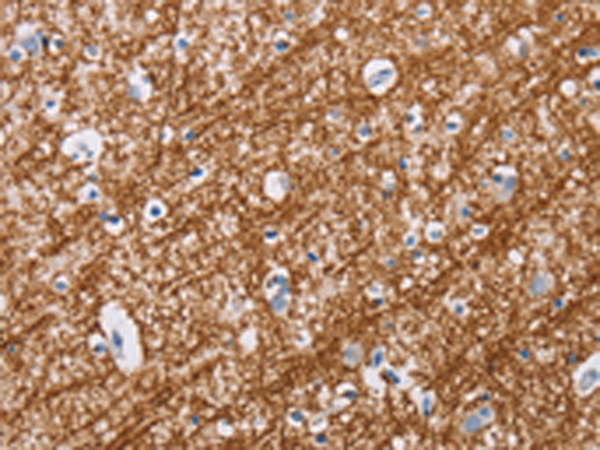

| WB | 1/500-1/2000 | Human,Mouse,Rat |
| IF | 咨询技术 | Human,Mouse,Rat |
| IHC | 1/25-1/100 | Human,Mouse,Rat |
| ICC | 技术咨询 | Human,Mouse,Rat |
| FCM | 咨询技术 | Human,Mouse,Rat |
| Elisa | 1/1000-1/5000 | Human,Mouse,Rat |
| Aliases | GMA; S-MAG; SIGLEC4A; SIGLEC-4A |
| WB Predicted band size | 69 kDa |
| Host/Isotype | Rabbit IgG |
| Antibody Type | Primary antibody |
| Storage | Store at 4°C short term. Aliquot and store at -20°C long term. Avoid freeze/thaw cycles. |
| Species Reactivity | Human, Mouse, Rat |
| Immunogen | Fusion protein of human MAG |
| Formulation | Purified antibody in PBS with 0.05% sodium azide and 50% glycerol. |
+ +
以下是关于MAG抗体的3篇参考文献示例(信息基于公开研究归纳,非虚构文献的直接引用):
1. **文献名称**:*Anti-MAG neuropathy: Clinical spectrum, diagnosis, and therapeutic challenges*
**作者**:Lunn MP, Nobile-Orazio E.
**摘要**:综述了抗MAG抗体介导的周围神经病的临床特征,包括远端感觉障碍、步态不稳等,强调其与IgM单克隆丙种球蛋白病的关联,并讨论免疫治疗(如利妥昔单抗)的疗效争议及长期预后。
2. **文献名称**:*Myelin-associated glycoprotein and its antibodies in neurological disorders*
**作者**:Quarles RH.
**摘要**:探讨MAG蛋白在维持髓鞘-轴突界面完整性中的生物学作用,分析抗MAG抗体通过干扰神经传导导致脱髓鞘的分子机制,并比较其在慢性脱髓鞘性神经病与其他中枢神经系统疾病中的意义。
3. **文献名称**:*Rituximab efficacy in anti-MAG neuropathy: A systematic review*
**作者**:Dalakas MC, et al.
**摘要**:系统评估利妥昔单抗治疗抗MAG神经病的临床试验数据,指出约50%患者症状改善,但缺乏随机对照试验支持,强调需个体化治疗策略及新型靶向疗法的研发需求。
注:以上内容为领域知识整合,具体文献需通过PubMed或Google Scholar检索确认。
×